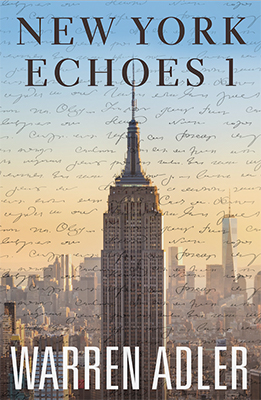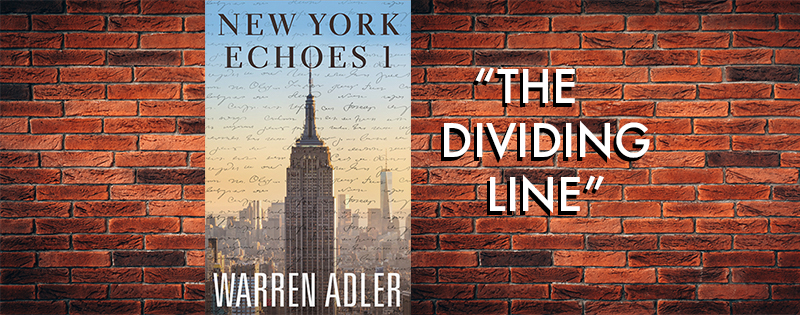Read the Short Story “The Dividing Line” from NEW YORK ECHOES 1
Lavine was sitting in his East Side apartment reading the New York Times. From time to time he lifted his eyes to peer out the window, where across the street a glass-walled, spanking-new condominium was taking shape. His wife, Betsy, was sitting opposite reading the arts section of the Times. Occasionally she would glance upward and look at her husband.
“We’ll just have to get used to it,” she said.
She was, he knew, a pragmatic woman. She knew how to cope, make do, steer around controversy and, mostly, how to keep him content. He was, now that he was seventy-five, eager to find tranquility, a tough chore in today’s global environment. The news from everywhere was awful, a bill of fare of suicide killings, mass murders, car bombs, ethnic slaughtering, and terrorism fears.
They had been married twelve years now, and she was twenty years his junior. She was his former secretary when he was in full-time law practice, having worked for him for nearly fifteen years. The firm had a mandatory retirement age of sixty-five.
As his secretary, Betsy was exemplary, efficient, competent, and understanding. Their relationship was friendly and beyond reproach, even in his widowhood. Neither would have dared to violate the stringent new politically correct rules regarding office behavior.
With that stricture gone with his retirement, she swallowed her pride and approached him with both trepidation and courage.
“If you ever marry again, consider me as your perfect choice of wife,” she told him when he considered his future on the cusp of retirement. “I know all your faults and virtues. I know your business. I have spent more time with you than anyone you know. And…” She winked at him. “I have always loved you.”
Oddly, he was not shocked by the boldness of her assertion. He had always felt her special interest in him, and he harbored a vague attraction for her, even in his married days. She was, after all, quite attractive, with the kind of full figure he had always admired and she came to work perfectly groomed and attired in ways that set off her strong physical points. At times she had even entered his fantasy world, but he was too ethical, hidebound, and cowardly to open that window of action.
He did mull over her offer. With retirement came the loss of his work routine, which enhanced the loneliness of his widowhood. His two children were grown and lived on the West Coast and although he was still fit and not without sexual urges, he could no longer compensate with the ingrained habits and long hours of a fervent legal career. Nor was he in love with Betsy. Attracted, yes, but not, as he defined it, in love.
After retirement, they continued to see each other. She became available to sort his papers and continue to serve him in a business way. Without the conduct restrictions mandated by the firm, and the legal barriers imposed, they now socialized in dating mode, and with the boundaries broadened, they developed a relationship, meaning they became sexually involved. To him, it was a revelation. She was remarkably giving, uninhibited, adventurous, and exciting as a sex partner and it served its purpose as a profound bonding mechanism. Besides, they were already bonded in the practical ways of domestic cooperation.
At one point in their new relationship, Betsy suggested in her practical way, that he live with her for a trial period and see if it worked out. It did and they married. She smoothly transferred her secretarial skills to their domestic life and organized and comforted him and, as vanilla ice cream goes with apple pie, she completely revived his interest in sex. These days that pursuit was achieved with some pharmaceutical assistance. She interpreted her own healthy sexual appetite as making up for lost time. He was delighted and the process went a long way to further bond with her and by the miracle of chemistry and attraction, he fell in love with her.
Their life in Manhattan was filled with theater going, concerts, opera, lectures, and dinner in restaurants or with friends. He served on a number of not-for-profit boards, and she had her opera club and circle of female friends.
“It’s not that bad,” she told him, referring to the glass-walled condominiums. “Better than that heap of old brick.”
“That heap of old brick was built in the early thirties,” he said. “Like me. I hated to see it go.”
“The new condo is an improvement to the neighborhood,” she said in her gently persuasive way.
He started to concentrate on the Times again, then looked up at the emerging building.
“What is the dividing line?” he asked.
“The dividing line?”
“Between the old and the new. Relevance and irrelevance.”
“I don’t get it.”
“That’s because you’re transitional.”
Her forehead creased and her eyes narrowed, which was the way she often expressed skepticism.
“You’re fifty-five, a baby boomer. I preceded you by twenty years. You have a dividing line as well, but you’re not conscious of it.”
He knew he sounded like he was playing the wise man, a bit pompous and all-knowing, but he felt the need to illustrate what had started in his mind as a vague concept and was fast coming into full bloom as an important and essential truth. In an odd way, he felt that the two of them were transported into a New Yorker cartoon waiting for someone to write a caption.
“I was sitting in my doctor’s office last week. Picked up People magazine and I didn’t know a single one of the featured people, nor did I care. I can’t even name them.”
“Some of them are foreign to me as well. I do know some, the older ones.”
“At some point, the editors will phase them out. Like for example Eddie Cantor.”
“Who is that?”
“Who is Eddie Cantor? You’re kidding.”
“No. I’m not.”
“He was the biggest movie star and comedian in the early thirties. He had a wife named Ida and five daughters… I think it was five daughters. He was also on the radio every Sunday night along with Jack Benny, Charlie McCarthy, and Fibber Magee and Molly.”
“Sorry. I don’t remember. I wasn’t born until 1949. Who was Fibber Magee?”
He sighed and shook his head, showing an amused smile.
“My point about the dividing line. When do memories become irrelevant?”
“You mean when do they fade out from the collective memory?”
She seemed serious, but he had the impression she was humoring him.
“There has to be a dividing line, a point where living memory becomes merely history, where things have become obliterated and lost except to those whose memory is still alive. A point where what used to exist, buildings, neighborhoods, once famous actors and politicians, fade from memory and become mere history. Like my reference to Eddie Cantor and that old pile of bricks that has disappeared.” He pointed with his chin to the new condominium rising outside. “People fade away and die out and with them goes their memory.”
“I will always remember that pile of bricks that has disappeared,” he muttered. “Not for its aesthetic value, but for its being there.”
He knew he was groping for some clear way to express what he was suggesting and searched his mind for other examples. “Take theaters. The Loews Paramount, the Capital, the Roxy. All gone. And 52nd Street, Swing Street in my time. Leon and Eddie’s, the Downbeat Club. And 42nd Street. Grant’s, where you could get the best hot dogs, and all those movie theaters where you could go for a quarter and get a double feature.” He felt himself on a roll. “And Lindy’s, the real Lindy’s, and Shrafft’s, and the Third Avenue El, and the Fifth Avenue double-decker buses and trolley cars. The subway was a nickel. Take politics.” He mulled the thought for a moment.
“Who was Harry Truman’s vice president? And Fiorello LaGuardia. He was once a person, yet most people will remember his name merely as a New York airport.”
“Lots of airports, high schools, streets, towns, and colleges are named after people that no one remembers. I don’t know where you’re going with this.”
“I’m searching for the dividing line,” he said, somewhat testily. “Like when was the moment when the curtain went down on the memory of Eddie Cantor and the Roxy and the Paramount and double-decker buses.”
“And Harry Truman’s vice president. I know that one. It was Alben Barkley. I read McCullough.”
“Not fair. That was history. He was, by the way, referred to as ‘The Veep’.”
“So how many people now retain this bit of information as living history.”
“Life goes on, darling. People who knew Shakespeare and called him Willy or Will or Bill are long gone. Think of all the things that have disappeared, never mind people. My mother wore a corset and hung her clothes on the line. My father wore a fedora and chain-smoked cigarettes. What man wears hats, and only young idiots or fools smoke cigarettes. And the sun. No one told us you could get cancer from the sun.”
He nodded, went back to reading the Times, but he couldn’t concentrate and looked up again at the building going up. But the ideas they were discussing continued to hold his attention.
“I guess that’s why I love black-and-white movies of the thirties and forties. My time. I love to look at the details, the backgrounds. The clothes my mother wore, the décor and furniture, the telephones, the old appliances, the old cars, the slang. Words like scram and mug and sucker. Laurel and Hardy, the Marx Brothers, the Ritz Brothers. Jean Harlow. Do you know she died when she was twenty-seven years old? Imagine.” He felt a lump grow in his throat and unaccountably a sob began deep inside of him and, for a moment, his eyes teared. I am a sentimental old fool, he told himself.
He hadn’t realized that she was watching him.
“Remember, darling. I watched those with you, mostly for the stories. I love those old stories.”
“And I point out who those actors are?”
“Yes, you do.”
“I do appreciate your trying to enter my past. I love you for that.”
“Now I know why you called me transitional. You have twenty years of living memory on me. Someday my dividing line will come. My range of celebrities and memories will fade away from the public consciousness just like yours.”
“It’s all changed too damned fast,” he muttered. “You don’t even get much of a chance to savor it. And you don’t know how good it was until it’s gone.”
“Now you’re getting maudlin,” she admonished.
He ignored her criticism, knowing she was right.
“I can’t keep up,” he sighed. “Once I thought I was actually computer literate. I could do e-mail, use Word for my writings and briefs. I could read an Excel sheet. Now, just a handful of years later, all I know is fast becoming obsolete, old hat. I am falling behind. I feel overwhelmed by change. I find my greatest comfort in looking backward.”
They exchanged glances. Her gaze seemed alarmed. She sees my fear, he told himself.
“Did it ever occur to you darling, that things are better than they were? That you’re living longer, that we’ve grown smarter in some ways, what with all the technological advances. Did you ever see a computer in those old movies?”
“Maybe I’m just bitching about the changes that are happening so damned fast and as you grow older you become more and more irrelevant locked in some place and mindset that doesn’t exist anymore.” He rustled his paper and went back to reading the Times. “Look at this. Horror upon horror. Then again, we did have our horrors and bloodbaths. Of course, we didn’t have instant reporting back then and the reach of communications.”
He sensed he was heading for something more cerebral than emotional now, forcing himself into a lawyerly mode to justify his premise.
“You’re just looking at the surface of things, darling,” she said after a long silence. In her pragmatic way, she had been mulling over her own thoughts. “The more things change the more they remain the same.”
“Tell it to my mirror,” he chuckled.
“I mean human nature. The way we are. Our inner core. That never changes. No matter if that pile of bricks is demolished. External change happens, but through it all, we remain the same. As humans, we are constant in our emotions and our behavior. Like Shakespeare, who I just mentioned. You know why he survived for five hundred years? He knew the everlasting unchanging immutability of human nature.”
“My my,” he said chuckling. “You are so profound and eloquent today, my love.”
Suddenly she rose, left the room, and was back in a moment. She stood before him and opened her palm in which was a little blue pill, which he recognized, of course.
“Take this,” she whispered, bending over and kissing him on the lips.
“Finish your paper and contemplate your lost world over there for the next hour. Then I’ll illustrate how human nature hasn’t changed very much at all.”
He took the pill from her and swallowed it.
It might not be a complete answer, he thought happily, but she did have a point.
“By the way,” he said as she started to leave the room again. “Let me tell you who Fibber Magee was.”
She turned, looked at him, and, putting her hands on her hips, she straightened her posture in a mocking haughty and indignant manner.
“Frankly, Scarlett,” she said. “I don’t give a damn.”
Then she pranced out of the room. 🔲
Find this story and others in the sweeping collections New York Echoes 1 and New York Echoes 2



